South Carolina
As the South experiences extreme heat and increased flooding, there is no question we are at a critical time for our environmental future. We have the opportunity to protect our remarkable natural resources and to help turn the tide on climate change. SELC was built for this.
Rooted in the South, we use strong legal and policy work, strategic vision, and pragmatic problem solving in all three branches and at all levels of government. When one door is closed, we find another way. With our commitment to place, SELC is building on nearly 40 years of success in South Carolina and five other Southern states and driving results that resonate across the nation. That’s why we say, “Solutions Start in the South.”
Now is the time to act. Join us.
SELC takes next step to protect horseshoe crabs and red knots
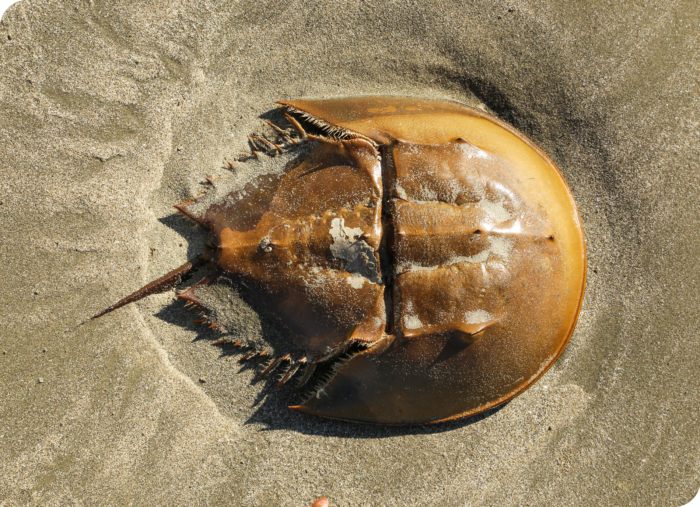
After using litigation to stop the commercial harvesting of horseshoe crabs at Cape Romain National Wildlife Refuge, SELC is taking the next step to protect horseshoe crabs and the threatened Rufa red knot, a shorebird that depends on the crabs’ eggs to fuel a transpolar migration. South Carolina is the only state that allows biomedical companies to capture thousands of crabs and hold them for months on end, including during spawning, in man-made containment ponds until they can take their blood for pharmaceutical purposes. There is a synthetic alternative to horseshoe crab blood that is equally effective. We filed a federal lawsuit in 2022 to rein in the permits that allow this destructive and unnecessary practice.
New web tool clarifies threats to the changing coast
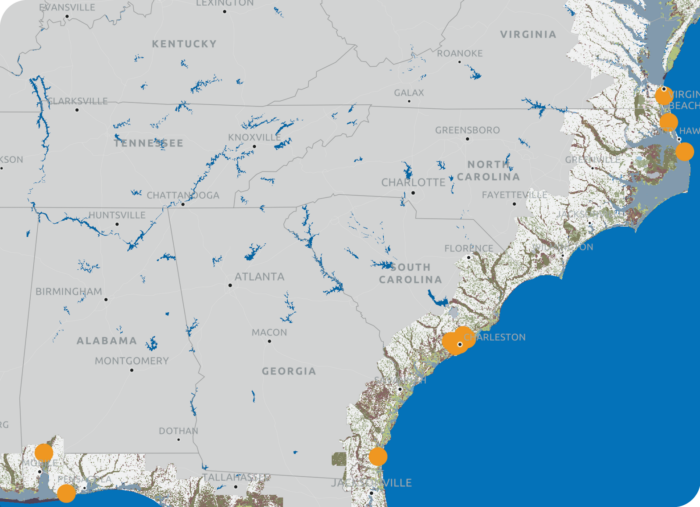
South Carolinians are experiencing the impact of climate change as more powerful and frequent storms make flooding a constant threat. The accelerating rate of sea level rise in Charleston is adding to this vulnerability, but developers and officials across the Lowcountry are failing to adapt and protect our coastal resources and communities. To raise awareness of these threats, SELC launched The Changing Coast, a website and interactive map showing how rising seas and a changing climate will reshape the Southern coast in the coming years.
Defending against inappropriate development
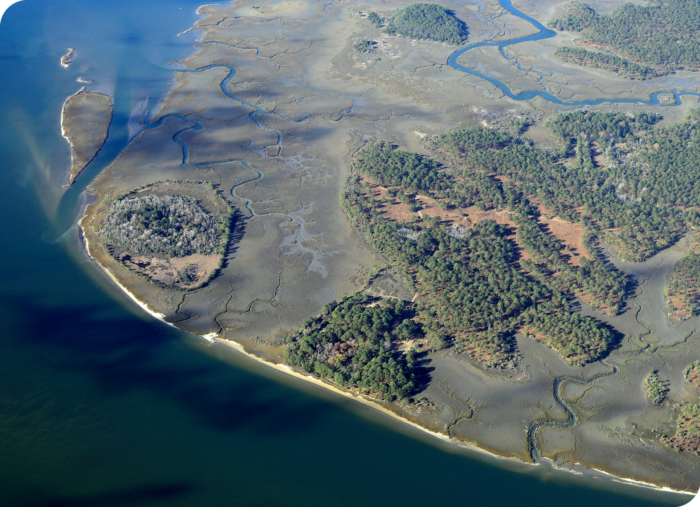
Last summer, we filed a federal lawsuit to challenge plans to destroy wetlands and marshes for the Cainhoy development, a proposed 9,000-acre residential and commercial development that would destroy nearly 200 acres of wetlands and place thousands of new homes directly in a floodplain. The U.S. Army Corps of Engineers approved a Clean Water Act permit for this project over our objections, ignoring our expert reports outlining viable, less-damaging designs for the project that could dramatically lower wetland impacts.
Helping the Phillips Community confront a destructive highway project
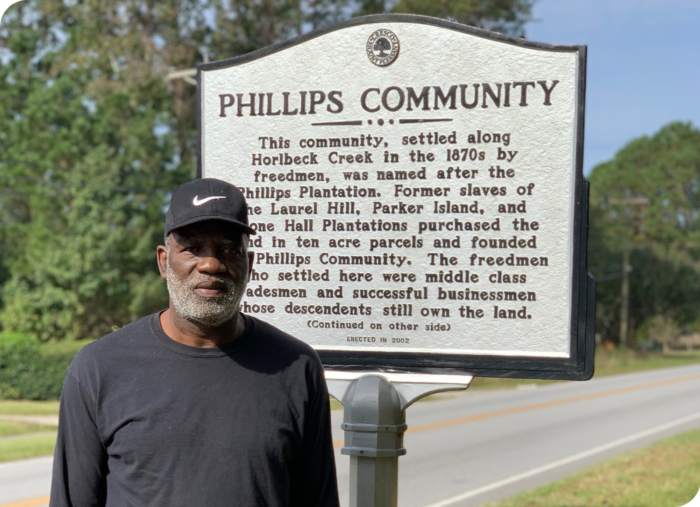
Founded by freed people after the Civil War, the Phillips Community outside of Charleston is fighting to stop a proposal to widen Highway 41 that would bisect the community. The existing road is already vulnerable to high tide flooding, and the widening would exacerbate flooding and result in the condemnation of many properties in the historic neighborhood. After SELC and our partners came alongside Phillips residents and pushed the local government to scrap the plan, the county is moving forward with a much-improved alternative. SELC will continue to work with the Phillips Community in the upcoming permitting process to support the new alternative that is favored by the community and its residents.
Solutions start in South Carolina.
Nonprofit and nonpartisan, we are the Southern Environmental Law Center. The South’s largest and most effective environmental defender.
Solutions for a healthy environment start in South Carolina. Your support helps make our wins possible.
Innovative coastal resilience policy
Flooding is the Lowcountry’s top threat, and SELC is promoting solutions that protect the coast while opposing misguided responses. We helped pass a historic coastal resilience law, and now we are working to shape the state’s new agency—the South Carolina Office of Resilience—and its statewide plan, which can help direct federal disaster funding to those who need it most, prioritize nature-based flooding solutions, and keep development out of vulnerable areas.
Responding to the Charleston seawall
As the Corps of Engineers continues to approve irresponsible projects (like Cainhoy, above) that will worsen flooding in Charleston, the Corps and the city are seeking to protect downtown by asking for more than a billion dollars from taxpayers to build a seawall that fails to account for a realistic amount of sea level rise and may actually exacerbate flooding problems. SELC is addressing this proposal, which would permanently alter the Charleston peninsula, by pushing the city and the Corps for a revised plan that would include nature-based solutions that are economically feasible and inclusive of all neighborhoods.
Defending clean energy gains
Through a string of historic victories at the Public Service Commission in 2020 and 2021, SELC helped get the state’s energy planning on a path away from risky fossil fuel power and toward clean energy alternatives. For the next round of utility energy planning in 2023, we will continue to press for speedy retirement of coal fired power plants, make sure coal is not simply replaced by another fossil fuel, and advocate for expansion of efficiency, solar power, and battery storage.
Standing up for affordable clean energy
South Carolina law protects access to energy choices—like rooftop solar and efficiency—that allow customers to control their electricity bills. SELC is focused on protecting and promoting customer access to these cost-saving options, particularly as the high costs of coal and natural gas continue to drive up customer bills. And following up on a settlement we helped secure in 2022, we are working with Duke Energy and allies to expand the utility’s energy efficiency programs for customers who need energy bill relief the most.
Statewide clean water enforcement
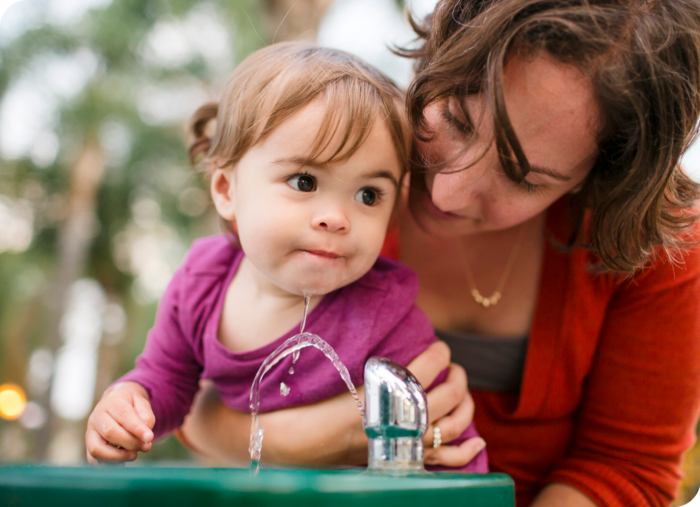
SELC is tackling the problem of industrial toxins known as PFAS and 1,4-dioxane, which are known to cause serious health impacts but conventional drinking and wastewater treatment plants do not remove them. We are investigating potential industrial sources of PFAS across South Carolina and urging state agencies to use their authority under the Clean Water Act to protect the public from these toxins. SELC also began working with the Charleston Waterkeeper in 2021 to investigate industrial facilities discharging polluted stormwater. Along with our partner, SELC plans to identify illegal discharges in and around the Charleston Harbor and bring these facilities into compliance with the Clean Water Act.
